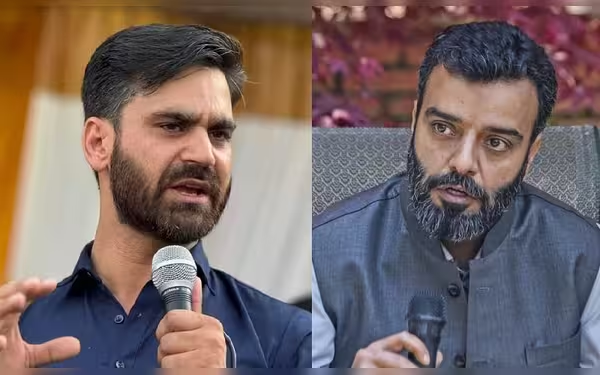Thursday, November 21, 2024 08:58 AM
Ruhullah and Parra Clash Over Article 370 Debate
- Parra questions Ruhullah's inaction on Article 370 restoration.
- Ruhullah defends his legislative approach in BJP-majority Parliament.
- Ongoing dialogue highlights complexities of Jammu and Kashmir's political status.
 Image Credits: menafn
Image Credits: menafnRuhullah and Parra engage in a heated debate over Article 370, highlighting political tensions in Jammu and Kashmir.
The ongoing debate surrounding Article 370, which granted special status to Jammu and Kashmir, has reignited tensions among political leaders in the region. Since the abrogation of this article on August 5, 2019, various political figures have expressed their views on the implications of this significant change. Recently, Waheed Parra took to X to challenge Aga Ruhullah Mehdi, questioning his actions and inactions regarding the restoration of Article 370.
Parra raised several critical points, asking why Ruhullah did not propose a resolution in Parliament to condemn the abrogation. He emphasized that such a resolution would have been a powerful statement against the changes imposed on Jammu and Kashmir's political landscape. Instead, Parra noted that Ruhullah chose to introduce a bill aimed at restricting liquor sales in the region, which he argued was a misstep. He suggested that a bill focused on restoring Article 370 could have sparked essential discussions about the region's future.
Furthermore, Parra criticized Ruhullah for not advocating for legislation to address the misuse of the Unlawful Activities (Prevention) Act (UAPA), which has been under scrutiny for enabling prolonged detentions without trial. He pointed out that with the support of the INDIA alliance, there was a chance to provide relief to those suffering under these laws in Jammu and Kashmir. Parra also questioned the absence of formal protests or legislative actions against reservation policies affecting the region, suggesting that this could have been an opportunity to voice concerns.
In response, Ruhullah defended his position, arguing that pushing for a resolution or bill on Article 370 in a BJP-majority Parliament could lead to its rejection, complicating the quest for autonomy. He explained that his approach to advocating for rights, including the restoration of Article 370, is rooted in careful consideration of the political landscape. Ruhullah expressed that he did not want to risk a negative outcome that could undermine the cause.
Ruhullah also mentioned that he introduced the liquor bill to stimulate debate, noting that the BJP had declared Gujarat a dry state, which could open avenues for discussion in Jammu and Kashmir. He highlighted his efforts in Parliament, including submitting a question regarding the revocation of both UAPA and the Armed Forces Special Powers Act (AFSPA), although it was not included in the parliamentary agenda. He emphasized that it is too early to expect immediate results after just one session in Parliament.
Addressing the issue of reservation policies, Ruhullah stated that discussions should occur within the parliamentary framework rather than through protests. He affirmed, "I have only had one working session of Parliament till now. There is a lot to come." He expressed confidence in his party's commitment to addressing these issues, stating that they had made it part of their manifesto.
Ruhullah concluded by expressing his willingness to be scrutinized for his commitment to the cause of Article 370, stating, "I like being put under regular scrutiny for the cause of 370. That's what I wanted from day one." He reflected on his solitary struggle for the cause in the past and expressed satisfaction that he is now being held accountable by a larger audience.
This ongoing dialogue between political leaders highlights the complexities surrounding the issue of Article 370 and the broader implications for Jammu and Kashmir. As discussions continue, it remains crucial for leaders to engage in constructive dialogue and seek solutions that prioritize the rights and concerns of the people in the region. The future of Jammu and Kashmir's political status hangs in the balance, and the actions taken by its leaders will undoubtedly shape the path forward.













